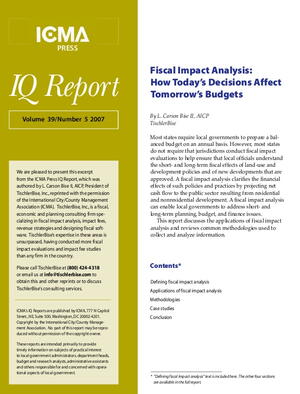
Most states require local governments to prepare a balanced budget on an annual basis. However, most states do not require that jurisdictions conduct fiscal impact evaluations to help ensure that local officials understand the short- and long-term fiscal effects of land-use and development decisions and policies. A fiscal impact analysis clarifies the financial effects of such policies and practices by projecting net cash flow to the public sector resulting from residential and nonresidential development. A fiscal impact analysis can enable local governments to address short- and long-term planning, budget, and finance issues. This excerpt from the ICMA IQ Report provides a primer on the applications of fiscal impact analysis, reviews common methodologies used to collect and analyze information, and outlines the many benefits of fiscal impact analysis.
